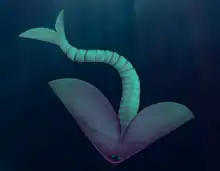Erjiecaris
Erjiecaris Is an extinct genus of bivalved Cambrian arthropod, known from the Chengjiang Biota of Yunnan, China. It is only known from a single species Erjiecaris minisculo. Around 1 centimetre (0.39 in) long, It has an unusual flattened head-shield, with an elongate body with at least 19 segments and a forked tail similar to Waptia. Unlike most bivalved arthropods, its simple, unstalked eyes are placed on top of the headshield. It was likely a nektobenthic (swimming above ocean floor) deposit feeder. The relationship of Erjiecaris to other arthropods was considered uncertain in its original description.[1] A later study suggested it was a member of Hymenocarina.[2]
| Erjiecaris Temporal range: | |
|---|---|
 | |
| Life restoration | |
| Scientific classification | |
| Domain: | Eukaryota |
| Kingdom: | Animalia |
| Phylum: | Euarthropoda |
| Genus: | †Erjiecaris Fu, Zhang and Budd, 2014 |
| Species: | †E. minusculo |
| Binomial name | |
| †Erjiecaris minusculo Fu, Zhang and Budd, 2014 | |
References
- Fu, Dongjing; Zhang, Xingliang; Budd, Graham E. (2014-01-02). "The first dorsal-eyed bivalved arthropod and its significance for early arthropod evolution". GFF. 136 (1): 80–84. doi:10.1080/11035897.2014.884627. ISSN 1103-5897. S2CID 84916641.
- -López, Alejandro Izquierdo (July 15, 2022). "Extreme multisegmentation in a giant bivalved arthropod from the Cambrian Burgess Shale". iScience. 25 (7): 104675. Bibcode:2022iSci...25j4675I. doi:10.1016/j.isci.2022.104675. PMC 9283658. PMID 35845166. S2CID 250057171.
This article is issued from Wikipedia. The text is licensed under Creative Commons - Attribution - Sharealike. Additional terms may apply for the media files.